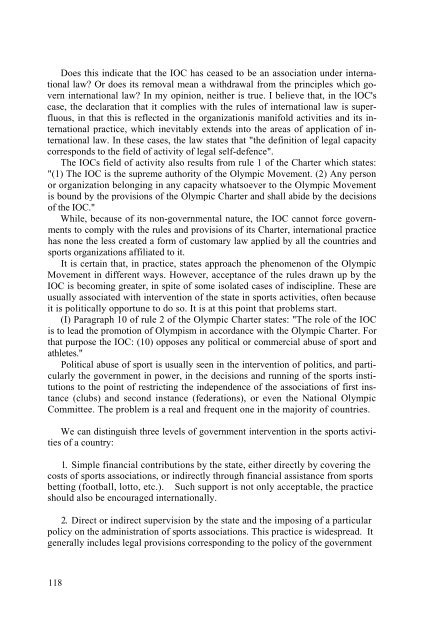Create successful ePaper yourself
Turn your PDF publications into a flip-book with our unique Google optimized e-Paper software.
Does this indicate that the IOC has ceased to be an association under international<br />
law? Or does its removal mean a withdrawal from the principles which govern<br />
international law? In my opinion, neither is true. I believe that, in the lOC's<br />
case, the declaration that it complies with the rules of international law is superfluous,<br />
in that this is reflected in the organizationis manifold activities and its international<br />
practice, which inevitably extends into the areas of application of international<br />
law. In these cases, the law states that "the definition of legal capacity<br />
corresponds to the field of activity of legal self-defence".<br />
The IOCs field of activity also results from rule 1 of the Charter which states:<br />
"(1) The IOC is the supreme authority of the Olympic Movement. (2) Any person<br />
or organization belonging in any capacity whatsoever to the Olympic Movement<br />
is bound by the provisions of the Olympic Charter and shall abide by the decisions<br />
of the IOC."<br />
While, because of its non-governmental nature, the IOC cannot force governments<br />
to comply with the rules and provisions of its Charter, international practice<br />
has none the less created a form of customary law applied by all the countries and<br />
sports organizations affiliated to it.<br />
It is certain that, in practice, states approach the phenomenon of the Olympic<br />
Movement in different ways. However, acceptance of the rules drawn up by the<br />
IOC is becoming greater, in spite of some isolated cases of indiscipline. These are<br />
usually associated with intervention of the state in sports activities, often because<br />
it is politically opportune to do so. It is at this point that problems start.<br />
(I) Paragraph 10 of rule 2 of the Olympic Charter states: "The role of the IOC<br />
is to lead the promotion of Olympism in accordance with the Olympic Charter. For<br />
that purpose the IOC: (10) opposes any political or commercial abuse of sport and<br />
athletes."<br />
Political abuse of sport is usually seen in the intervention of politics, and particularly<br />
the government in power, in the decisions and running of the sports institutions<br />
to the point of restricting the independence of the associations of first instance<br />
(clubs) and second instance (federations), or even the National Olympic<br />
Committee. The problem is a real and frequent one in the majority of countries.<br />
We can distinguish three levels of government intervention in the sports activities<br />
of a country:<br />
1. Simple financial contributions by the state, either directly by covering the<br />
costs of sports associations, or indirectly through financial assistance from sports<br />
betting (football, lotto, etc.). Such support is not only acceptable, the practice<br />
should also be encouraged internationally.<br />
2. Direct or indirect supervision by the state and the imposing of a particular<br />
policy on the administration of sports associations. This practice is widespread. It<br />
generally includes legal provisions corresponding to the policy of the government<br />
118

















